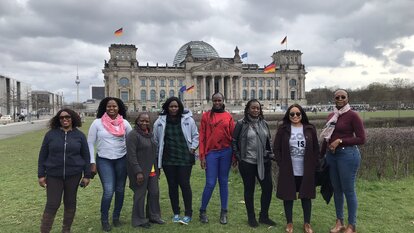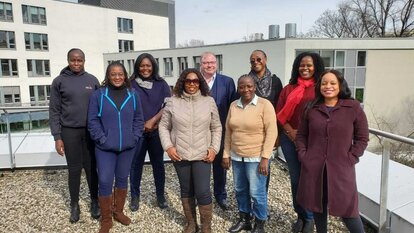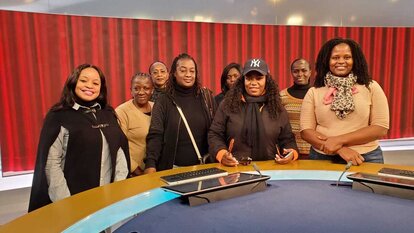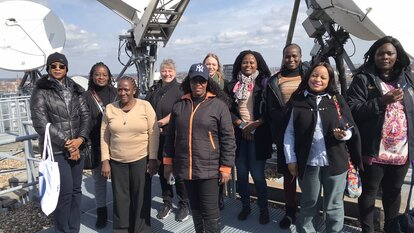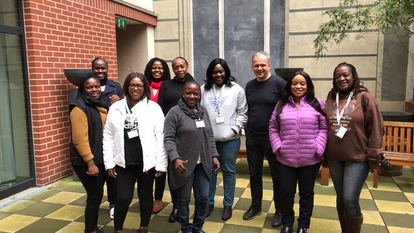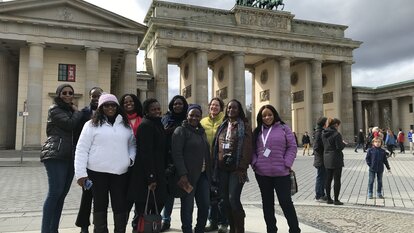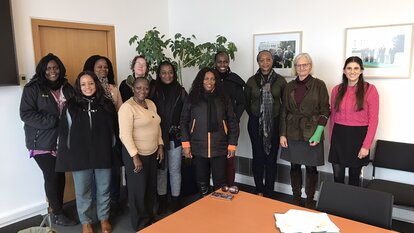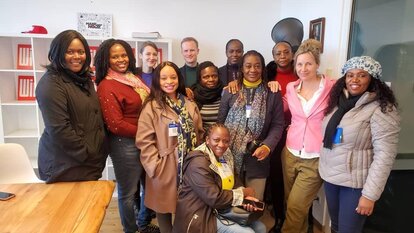Press Freedom
Through the glass ceiling - African female journalists fight their way up into leading positions
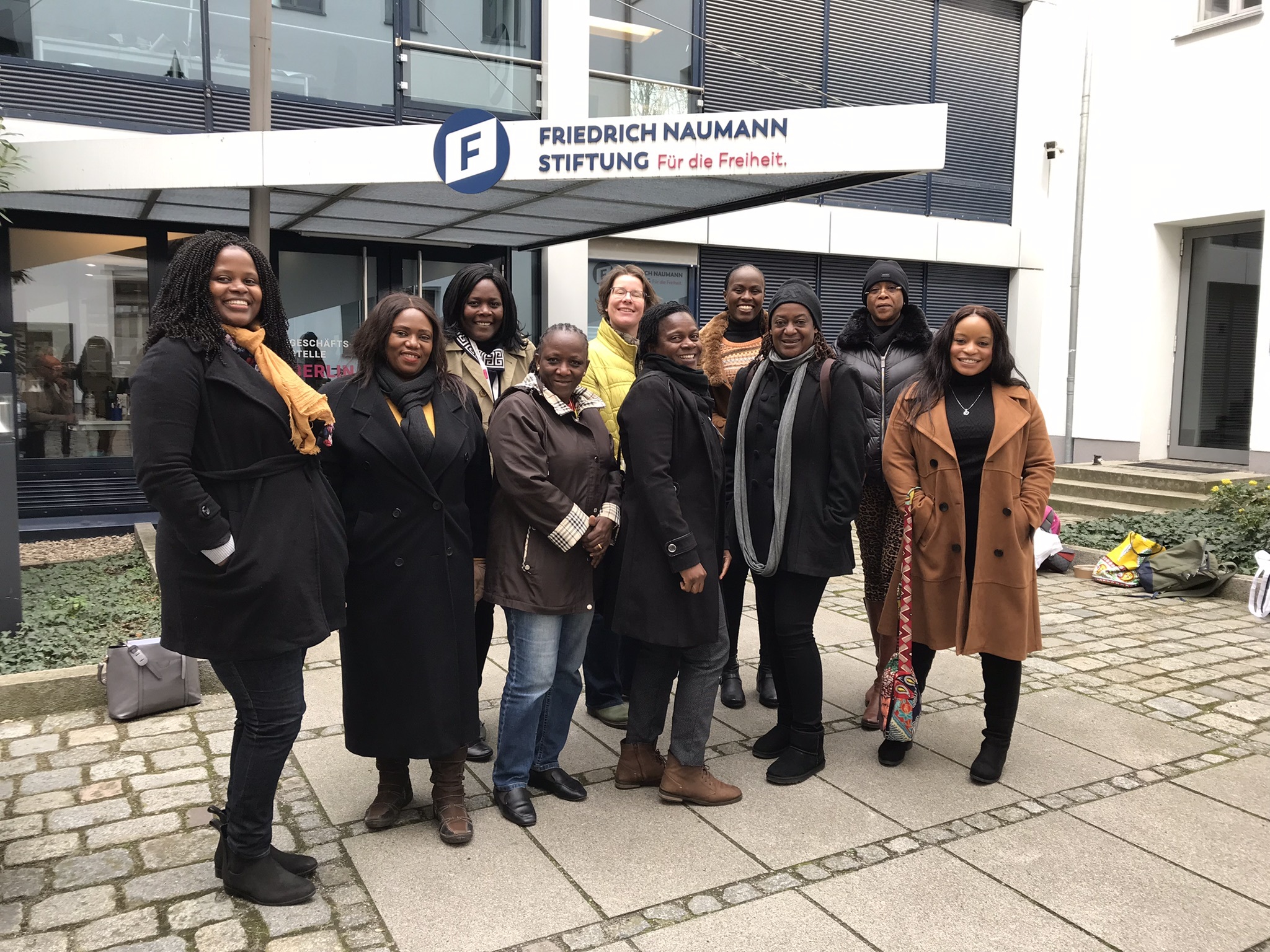
The energy in the room is tangible, as Anna-Lena von Hodenberg, Executive Director at HateAid, shares personal experiences ofu hate speach on the internet with the seven female journalists from Kenya, Tanzania and Zimbabwe. Each of the ladies present has already experienced psychological and sexualized violence, both from strangers and from their own colleagues and superiors.
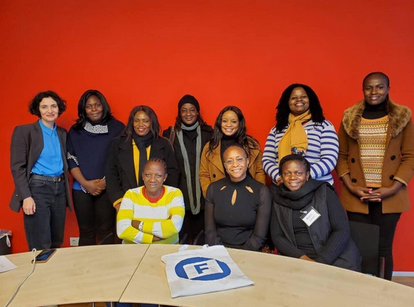
Die Journalistinnen mit Anna-Lena von Hodenberg, Geschäftsführerin von HateAid
© FNFTogether, the women develop new ideas on how they can better prepare themselves for such attacks in the future: Secure passwords, technical protection of their own data and devices, a strong community of friends and allied male as well as female colleagues, and demanding loyalty from their employer. Instead of having to justify themselves after being victims of hate speech, they will in future resort to strategies that defend their rights and give them strength.
Sexual harassment and discrimination are part of everyday working life
As senior women in African media houses, most female journalists have walked a rocky road. They have experienced sexual harassment as part of everyday life and have had their skills constantly questioned. "When it comes to promotions, male colleagues are always preferred, even if they are less qualified" describes Martha Mamombe, moderator at ZiFM Stereo. To get into leadership positions, African female journalists need staying power and almost superhuman stamina. "Often, highly motivated young women come to our newsrooms from university and can't stand the pressure of assault and expected favors. No one prepares them to survive on the job" says Faith Zaba, editor of The Zimbabwe Independent. That's why, together with the Friedrich Naumann Foundation in Harare, she launched the Womentorship Program, which supports and empowers young female journalists on their career path.
Keeping pace with technical innovations
Serfine Achieng, news editor at Citizen Television Kenya, highlights other tasks female journalists are currently facing: "Our media houses urgently need to look to the future. Technical equipment, data journalism, fact-checking, fake news and deepfakes are completely new challenges for us" she says after the exchange with fact-checker Sarah Thust from Correctiv.
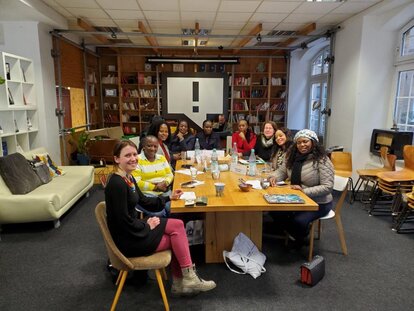
Bei Correctiv mit Sarah Thust
© FNFKnowing and marketing one's own competencies
Among the many appointments for the African female journalists is a talk with two freelance colleagues, who share their insights into the importance of self-marketing in addition to good professional work. Elena Matera, a science journalist, and Jacobia Dahm, a photojournalist, introduce their websites and social media presence and inspire the African women to present themselves more positively and to know and promote their own skills.
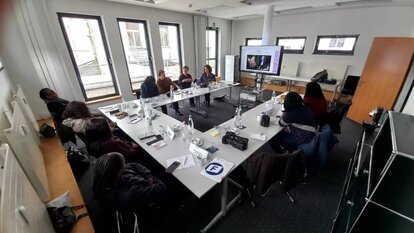
Mit Materia und Dahm im Gespräch
© FNFEquality and mentoring
One of the most important lessons learned during the week in Berlin is that thanks to the German Federal Equal Opportunity Act, companies with more than 100 employees can appoint an Equal Opportunity Officer. As an impulse from the discussion with Equal Opportunities Officer at Deutsche Welle Susan Bonney-Cox, Faraja Kihongole, journalist and camerawoman at Tanzania's Channel Ten, immediately suggested setting up such a position at her station.
And the journalists from Kenya, Tanzania and Zimbabwe are encouraged by another insight: "In Germany, too, women in leadership positions are fighting a similar battle to ours. You have already achieved a lot through changes in the law, raising people's awareness, mentoring programs and networks. We feel encouraged and connected to each other in our daily challenges and work for equality. "
Learn more about the International Academy for Leadership (IAF).
The IAF International Visiting Programmes provide a forum for politicians and civil society representatives from various countries to exchange ideas and experiences in Germany and Europe. Current and future decision-makers from the Foundation's project regions take part in a one-week program in which they meet German government officials, political parties, associations and think tanks.

